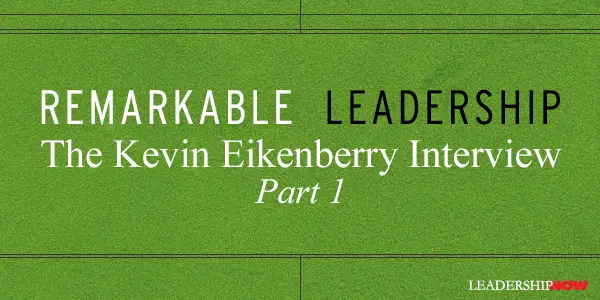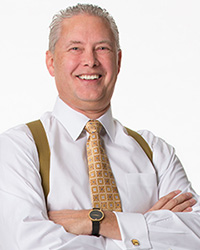 |
 |
07.23.07

Remarkable Leadership: The Kevin Eikenberry Interview Part 1 THIS WEEK—Monday, Wednesday and Friday—we will feature an interview with Kevin Eikenberry author of the book Remarkable Leadership. Kevin is the Chief Potential Officer of The Kevin Eikenberry Group, a learning consulting company that provides a wide range of services, including training delivery and design, facilitation, performance coaching, organizational consulting, and speaking services. Kevin believes that remarkable leaders are developed. Remarkable Leadership identifies the 13 competencies of remarkable leadership and offers a proven method for applying those competencies at any level of leadership. The book is thought-provoking and easily applied. In this interview, Kevin will share his thoughts on leadership development, lifelong learning, teamwork, delegating, followership and the biggest factor that could prevent you from becoming a remarkable leader.
THIS WEEK—Monday, Wednesday and Friday—we will feature an interview with Kevin Eikenberry author of the book Remarkable Leadership. Kevin is the Chief Potential Officer of The Kevin Eikenberry Group, a learning consulting company that provides a wide range of services, including training delivery and design, facilitation, performance coaching, organizational consulting, and speaking services. Kevin believes that remarkable leaders are developed. Remarkable Leadership identifies the 13 competencies of remarkable leadership and offers a proven method for applying those competencies at any level of leadership. The book is thought-provoking and easily applied. In this interview, Kevin will share his thoughts on leadership development, lifelong learning, teamwork, delegating, followership and the biggest factor that could prevent you from becoming a remarkable leader.
LeadingBlog: How do you define a Remarkable Leader?  LB: What is wrong with how most organizations do leadership development today? KE: The main thing that is wrong with what most organizations are doing is that they think of leadership development as being about events. We always say, “training is an event, learning is a process.” And it’s the same thing for leadership development. Organizations are looking for the magic pill, they've identified people as high performance or their next leader or “they've been a supervisor for three years so we'd better give them some training.” So leadership development looks like this event, this workshop, this seminar, this whatever, and when they've done that they've checked that box and that’s their leadership development process. I think the smartest organizations are looking at it differently. They're looking at leadership development much more holistically. They're thinking about a wider variety of activities, and experiences and processes. Anything from different sorts of assignments, different sorts of projects to application projects, to the chance to be coached or coach others, mentoring programs and a whole host of other things, put together specifically to work best for that organization. So in short, what’s wrong is that people are thinking about leadership development like they do most training and that is as events as opposed to thinking about a process in terms of what really makes learning work. LB: So more of a long term thing? KE: A long term thing, but an integrated thing. Integrated with the work. You could have training that is long term right? You could have a class this week and next month and four months from now and 21 years from now and all that sort of thing, but the real challenge is, I think, integrating it back into the work so that people can go back and really apply what they're learning. LB: You place a lot of emphasis on learning? Would you say that the ability or the desire to learn is the most fundamental skill of the remarkable leader? KE: That’s like the big softball for me. One of the early chapters in the book talks about that very thing. I do believe that the number one skill of a leader—the underlying core skill of a leader—is their ability to learn. Because, if we want all of these kinds of things in our employees or those we lead—we want flexibility and collaboration, and we want them to continually grow and we want them to develop and we want those things for them—then number one, we had better be doing those things ourselves. And secondly, if we want to continue to build our skills—as I said a remarkable leader is someone who does continue to build their skills—that means by definition, that we have to be ongoing, or as I say in the book, continual learners. To me, it is the fundamental underlying skill. And Michael, when I work with groups, I'll ask them when they think of the best leaders they've ever experienced, make me a list of their characteristics, and people will come up with a long list of great attributes, but they won't come up with the word learning. But without learning most of those other things aren't going to happen. LB: So you don't think leaders are born? KE: I don't. I don't think leaders are born. I think that all of us have a unique bundle of gifts and talents that are a part of our DNA and although there are some people that may have some innate skills that help them become some parts of the leadership process more easily—just like there are some people that innate skills that make them better mathematicians or musicians right? But I think just like those things that challenge us as a leader, is to play on our greatest strengths—to utilize our greatest strengths—to become more effective leaders. Because in the end, being a highly effective leader is about being a highly effective human. There are many different ways to lead and the challenge is finding the voice that we best lead with and build on those strengths first. LB: Good. How would you improve your learning ability? Or make the time for it? Sometimes we get so busy that we put “learning” off because we don't have time for it. KE: Absolutely. That’s why, when I started to write the book the learning competency was that remarkable leaders are continuous learners. And I don't think that that’s really true. We're not continuous learners. We're doing all sorts of things and although as human beings we are learning beings, we are not necessarily continuously, consciously learning. The kind of learning we are talking about here is conscious right? And so, I think it’s much more about being continual. On an ongoing basis as opposed to continuous—in every moment being a learner. I think that’s too high a bar to set for ourselves. I think the challenge for us all is that first of all we have to figure out how to make the time for it and the way to do that is to find opportunities. I think if I could encourage people to do just one thing that would make them a more effective continual learner—and it doesn't necessarily take a lot of time, it takes change of a couple of habits—that is that we would just take time to reflect more on our day; thinking about what worked and what didn't, what we want to repeat and what we don't want to repeat, and what we learned that we want to do differently the next time. If we would take 20 minutes every day to do that we would improve so rapidly I think it would be quite amazing. And the way we do that is to, first of all, make a conscious effort to do it. You say, “Well I don't have 20 minutes.” but yeah you do. Because you drive home from work and you listen to the radio or you take your walk and you listen to your I-pod or watch television in the evening, I think there are lots of times we can steal 15-20-30 minutes a day to do these kinds of things. It’s not like reading … having a book in hand or any of those other things. It’s just closing our mind down enough from other things to give ourselves a chance to reflect. And in the end, a learning process has to include a reflection process or we can't learn from our own experiences. I think that that is too often left out. And we're in such a rush to move from one thing to the next—from doing one tele-seminar to another interview, to do another phone call, right?—that we don't take the time to just stop take a mental deep breath and really think about what worked and what didn't. So if I'm going to do a better job in my next interview, I'd better stop and spend a little time thinking Michael, about what went well on this one or not. And I think that is the key for us to become continual learners. If I could say one thing, it would be take the time, make the time to reflect and ask those reflective questions. 
Posted by Michael McKinney at 03:23 AM
|
BUILD YOUR KNOWLEDGE
 

How to Do Your Start-Up Right STRAIGHT TALK FOR START-UPS 
Grow Your Leadership Skills NEW AND UPCOMING LEADERSHIP BOOKS 
Leadership Minute BITE-SIZE CONCEPTS YOU CAN CHEW ON 
Classic Leadership Books BOOKS TO READ BEFORE YOU LEAD |